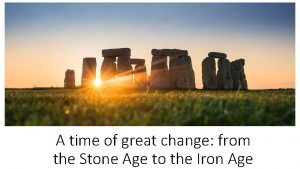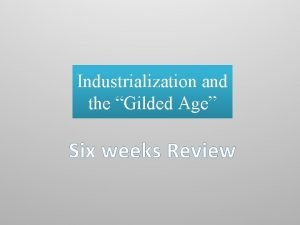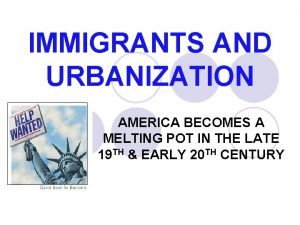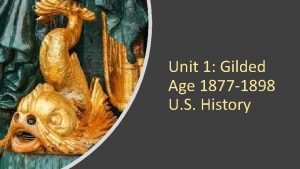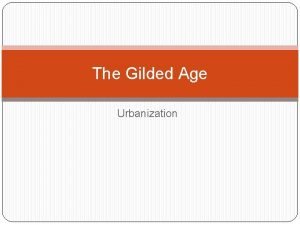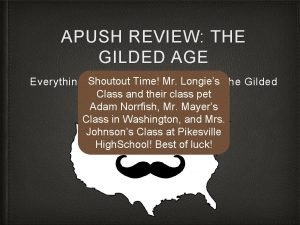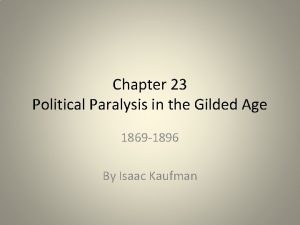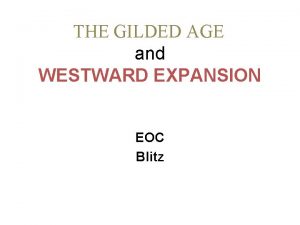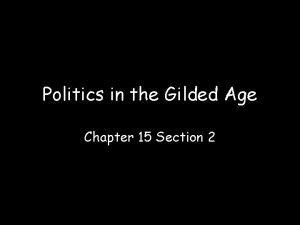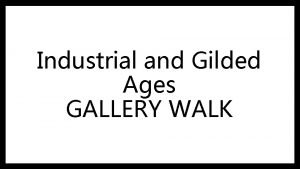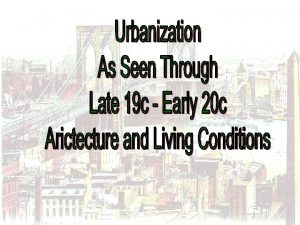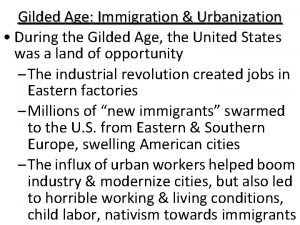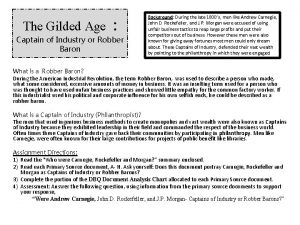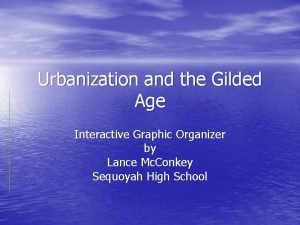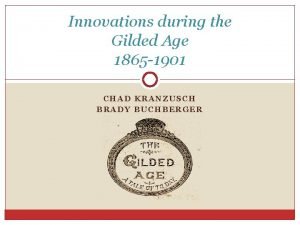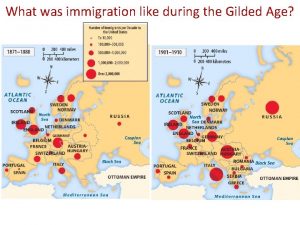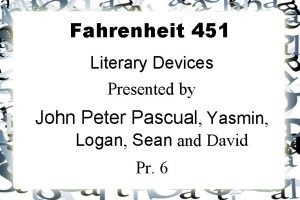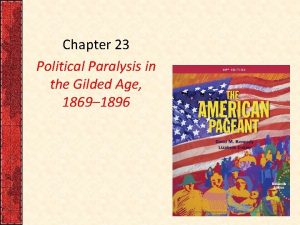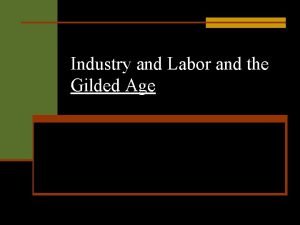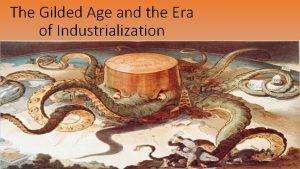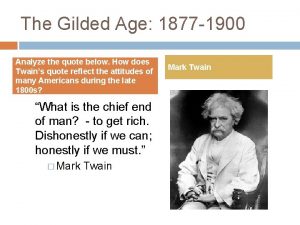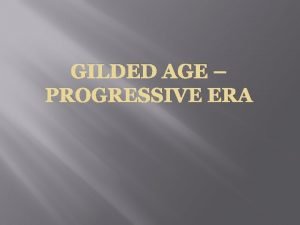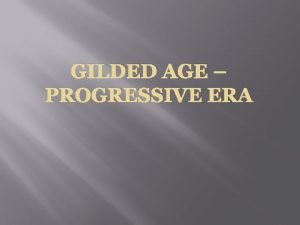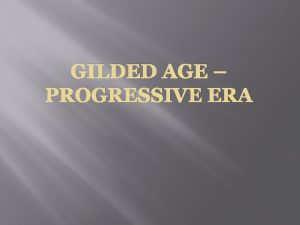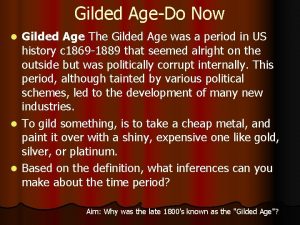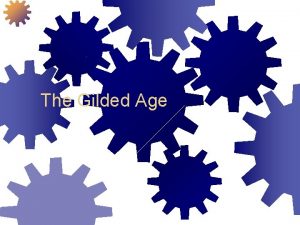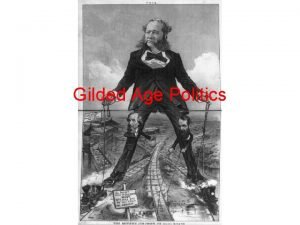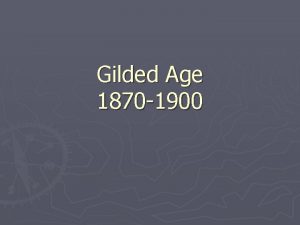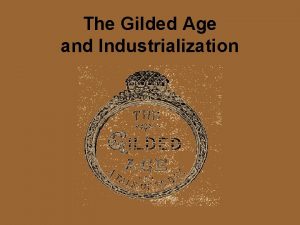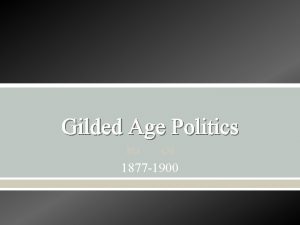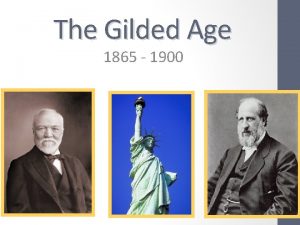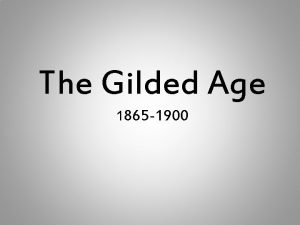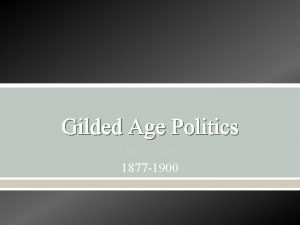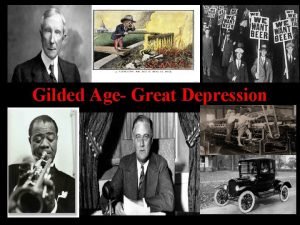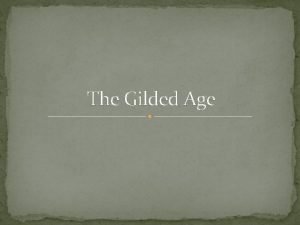The Gilded Age THE LATE 1800 S Part














![The Great Chicago Fire of 1871 • [video] https: //www. youtube. com/watch? v=a 3 The Great Chicago Fire of 1871 • [video] https: //www. youtube. com/watch? v=a 3](https://slidetodoc.com/presentation_image/3716cab064092f5183e1562a74d73d20/image-15.jpg)








![Catalog Companies • Orvis (1856) • Aaron Montgomery Ward (1872) • Sears [& Roebuck] Catalog Companies • Orvis (1856) • Aaron Montgomery Ward (1872) • Sears [& Roebuck]](https://slidetodoc.com/presentation_image/3716cab064092f5183e1562a74d73d20/image-24.jpg)




- Slides: 28

The Gilded Age THE LATE 1800 S

Part 1: Inventions (THE GILDED AGE)

What was The Gilded Age? • It was the period of time after the Civil War & Reconstruction, but before the 1900 s—in other words, the time that almost no one pays attention to… • “Gilded” means “layered in gold”

Food Innovations • Boxed cereal! = James Caleb Jackson boxed a breakfast cereal similar to “Grape-Nuts” of today. He called it “granula. ” Unfortunately, they had to be soaked overnight and were inconvenient. • Canned food! = Although the French were responsible for the invention, Americans canned a lot of food in the late 1800 s, which helped their economy and food supplies

Alexander Graham Bell • In 1876, Bell patented the first telephone • “The most wonderful thing in America” – Lord Kelvin of England • [Video] https: //www. youtube. com/watch? v=4 l. J 6 Pwb 15 JY

Thomas Edison • Edison patented 1, 093 inventions in his lifetime, established the first modern scientific laboratory, and is especially remembered for being the inventor of the incandescent electric light bulb • “Genius is one percent inspiration and ninety-nine percent perspiration” – Edison • [video] https: //www. youtube. com/watch? v=mn 8 u. GDg_5 f. A

George Washington Carver • An African-American, Carver was probably the best agricultural scientist of the late 1800 s • He found multiple uses for the peanut (among other foods like the soybean and sweet potato) • [Link] http: //www. tuskegee. edu/about_us/legacy_of_fame/ge orge_w_carver/carver_peanut_products. aspx • He also taught at Tuskegee Institute (founded by Booker T. Washington) • [video] https: //www. youtube. com/watch? v=sdz 8 XTNttdc

Part 2: Economics (THE GILDED AGE)

$$$-MONEY-$$$-MONEY-$$$ • Capitalism = An economic system that primarily allows private individuals and companies (rather than the state) to be involved with trade and industry • Free Enterprise = A person has the liberty to pursue business goals if he/she has the energy and initiative to do so • Entrepreneur = A person who organizes and manages a new business, often risking large amounts of financial investments • “Laissez faire” = “hands off” (a limited role of government in business) • [video] https: //www. youtube. com/watch? v=l. Jj. ILQu 2 x. M 8

The Steel Industry • Andrew Carnegie – He was an entrepreneur that built a successful steel business in Pittsburgh, PA • J. P. Morgan – He bought Carnegie’s company, made it even more profitable, and retired early to become a philanthropist (a person who funds new businesses and organizations) Question: Which pro sports teams can you think of that have a mascot with local, historical importance to the city/state?

The Oil Industry • John D. Rockefeller – With oil used for fuel and lamp lighting, Rockefeller took advantage of this terrific business opportunity and helped establish the Standard Oil Company (of Ohio). By the 1880 s, his company controlled 90% of the nation’s oil. • Rockefeller’s “monopoly” technique - He would lower his prices until a competitor was forced out of business. • Philanthropy – He and his sons gave away about 3 billion dollars in funding • [video] https: //www. youtube. com/watch? v=PYqr. FBm 7 qd. A

Part 3: Urbanization (THE GILDED AGE)

What does Urbanization mean? • Definition: The process of people and industries becoming more centralized in cities • [Video] https: //www. youtube. com/watch? v=IHoay. VYf. TVU

Immigration • Chinese Exclusion Act – The US banned Chinese immigrants in 1882 for ten years (…so many had come to work on the railroads) • Eastern Europe – About 70% of immigrants came from these Eastern European countries…these numbers included over 1 million Jews who fled from massacres
![The Great Chicago Fire of 1871 video https www youtube comwatch va 3 The Great Chicago Fire of 1871 • [video] https: //www. youtube. com/watch? v=a 3](https://slidetodoc.com/presentation_image/3716cab064092f5183e1562a74d73d20/image-15.jpg)
The Great Chicago Fire of 1871 • [video] https: //www. youtube. com/watch? v=a 3 Q 3 ww. RAGiw • 300 people died; 100, 000 left homeless

The Statue of Liberty • This giant, copper statue was a gift from France (delivered in 1886), signifying the importance of freedom —the tablet in Lady Liberty’s left hand bears the date, 1776 • [Video] https: //www. youtube. com/watch? v= k. OAS 3 bmt. SAM

City Transportation • Cable cars • Subways • Trolley cars • Bridges (the Brooklyn Bridge was the largest ever in 1883) • Skyscrapers

Where is the world’s largest skyscraper? • The United Arab Emirates

Labor Unions • Samuel Gompers – He, and others like him, wanted to form a federation that mostly dealt with craftsmen to ensure that they received better work conditions • The Moderate View (Gompers’ View) – Better wages, shorter hours, 6 -day work weeks (instead of 7), and the elimination of child labor • The Extreme View – This view believes in entitlement and total economic equality [unfortunately, many people in labor unions today hold to this view] • Labor Strikes – A refusal to work in order to get something (higher wages, better hours, etc. )

Part 4: Culture (THE GILDED AGE)

Opportunities for Women • Women’s Suffrage – Allowing women to vote • Wyoming was the first state to legalize women’s suffrage (1869); Colorado, Utah, and Idaho would follow in 1896

Sports in the Late 1800 s • Baseball (1839) • Football (1880 s) • Basketball (1891) • Boxing (a VERY long time ago) • [Video] https: //www. youtube. com/watch? v=ROXqdd. QYBH 4 Question: Why do you think these sports were not invented until the 1800 s? Also, what made them so successful in popularity?

The Gay 90 s • Definition: This was a description for the 1890 s because of the great economic success in America • More time and money for sports, plays, circuses (Barnum & Bailey), magazines, and modern treats (for example: soda and chewing gum) • [Video, stop @4: 56] https: //www. youtube. com/watch? v=htx. JLt 2 -m_Y • Middle class America was thriving
![Catalog Companies Orvis 1856 Aaron Montgomery Ward 1872 Sears Roebuck Catalog Companies • Orvis (1856) • Aaron Montgomery Ward (1872) • Sears [& Roebuck]](https://slidetodoc.com/presentation_image/3716cab064092f5183e1562a74d73d20/image-24.jpg)
Catalog Companies • Orvis (1856) • Aaron Montgomery Ward (1872) • Sears [& Roebuck] For those that did not move to cities, these companies reached a lot of rural customers through catalogs and the postal service [On-Demand Shopping Video] https: //www. youtube. com/watch? v=zkn. Lf. U 7 GJIw

Christianity in the Gilded Age • D. L. Moody – America’s best-known urban evangelist • [Video] https: //www. youtube. com/watch? v=Rx. Ds. N 8 uvc 8 E • Evangelism – He and his song leader, Ira Sankey, targeted cities and held evangelistic services similar to the 2 nd Great Awakening. • Bible Institutes & Prophecy Conferences – During this time in American history, many Bible institutes (later called “Bible Colleges”) were founded. Additionally, many attended prophecy conferences, which became popular during the late 1800 s-early 1900 s. • More people than ever before received access to advanced education in studying the Bible

Joseph Pulitzer • Pulitzer – An immigrant from Hungary, Pulitzer worked his way up a newspaper business to become one of America’s best-known publishers • Philanthropist – After an enormously successful career, he invested much of his money • Pulitzer Prizes – Each year, these prizes are awarded to people who excelled in journalism, literature, drama, and music

Literature in the Gilded Age • Romanticism vs. Realism – Before the Civil War, writers wrote “romantically” (centering on the hypothetical), but towards the end of the 1800 s, they were more “realistic” (centering on the actual) • Before, Americans had Herman Melville’s adventurous tale of whale-hunting (with Queequeg!); in the Gilded Age, they had Mark Twain’s description of “typical boys” in his stories of Tom Sawyer and Huckleberry Finn

Important Writers in the Gilded Age • Lew Wallace – He wrote Ben Hur. While writing the story, he became a Christian. • [video clip] https: //www. youtube. com/watch? v=fr. E 9 r. Xna. Hp. E • Charles Sheldon – He wrote In His Steps (this is where we got the slogan, “What Would Jesus Do? ”) • Emily Dickinson – A rather odd (and awkward? ) New Englander whose writings have been loved for over a century.
 Iron age dates
Iron age dates Iron age bronze age stone age timeline
Iron age bronze age stone age timeline Name 2 famous entrepreneurs of the gilded age
Name 2 famous entrepreneurs of the gilded age Melting pot gilded age
Melting pot gilded age The gilded age 1877 to 1898 worksheet answers
The gilded age 1877 to 1898 worksheet answers The message of this political cartoon is
The message of this political cartoon is Who helped build the transcontinental railroad
Who helped build the transcontinental railroad Gilded age apush review
Gilded age apush review Political paralysis in the gilded age
Political paralysis in the gilded age Gained voter support by helping immigrants find jobs.
Gained voter support by helping immigrants find jobs. Chapter 15 section 3 politics in the gilded age
Chapter 15 section 3 politics in the gilded age Gilded age cause and effect
Gilded age cause and effect Gilded age gallery walk
Gilded age gallery walk Louis sullivan gilded age
Louis sullivan gilded age Urbanization during the gilded age
Urbanization during the gilded age Gilded age eoc blitz review
Gilded age eoc blitz review Robber baron or captain of industry document set
Robber baron or captain of industry document set The gilded age vocabulary
The gilded age vocabulary Gilded age graphic organizer
Gilded age graphic organizer Https://play.kahoot.it
Https://play.kahoot.it Light bulb gilded age
Light bulb gilded age Gilded age
Gilded age Personification in fahrenheit 451
Personification in fahrenheit 451 Chapter 23 political paralysis in the gilded age
Chapter 23 political paralysis in the gilded age Chapter 23 political paralysis in the gilded age
Chapter 23 political paralysis in the gilded age Guilded age presidents
Guilded age presidents Gilded age
Gilded age Vertical integration gilded age
Vertical integration gilded age Gilded age quote
Gilded age quote

